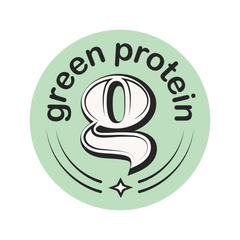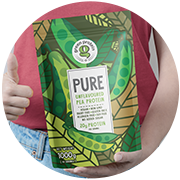
Unlocking the Power of Plant Protein for Effective Weight Loss and Muscle Gain
Are you looking to bulk up, trim down, or both? Plant-based protein powders are here to serve those goals. Loaded with muscle-building goodness, they’re perfect for everyone, not just the plant-eaters among us. If you’re after the best protein powder for muscle growth, don't overlook the plant-based aisle. Peas, rice, hemp, soy – these aren’t just for sides on your dinner plate; they're packed with protein that can help you gain muscle and lose fat.
Think of plant protein as your gym buddy. It's there to support your muscle gain without the extra baggage that some animal proteins carry. And for those days when the scale is your main focus, plant protein powders can be your best bet for weight loss. They’re lean, mean, and full of nutritional benefits that go beyond just building muscle.
So, whether you're lifting weights in the gym or lifting kids at home, a plant-based protein powder might just be the boost you need. It's simple: blend it, bake it, or shake it up – plant protein is versatile. Here’s to making your health and fitness journey a little greener and a lot more powerful.

What is Plant-Based Protein Powder?
Plant-based protein powders are sweeping the fitness and health community, offering a versatile and inclusive option for everyone, not just those who follow a plant-based diet. Each scoop is filled with goodness sourced from nature's own pantry. Pea protein, for example, is a standout for its muscle-mentoring amino acids, a hit for anyone looking to enhance muscle recovery after a workout.
Rice protein, with its gentle nature, is a dream for those with sensitive systems, offering its nutritional strength without stirring up any dietary dust. Hemp protein is the bohemian cousin, loaded with heart-healthy omegas and a wealth of fiber to keep you full and satisfied. And then there's the soy protein, a seasoned player in the plant protein game, bringing a complete amino profile to the table and wearing its heart health benefits proudly.
Together, these sources form a team that's as diverse in nutrition as it is in flavor. They're not just building muscles; they're building a foundation for overall wellness. Whether you're powering through a morning workout or hustling through a busy day, plant-based proteins are there to support you, every step of the way. They're the nutritional powerhouses that nature intended, ready to shake up your diet in the most delicious way.
The Role of Plant Protein in Muscle Gain
Contrary to some misconceptions, plant-based proteins are highly effective in promoting muscle growth, rivaling their animal-based counterparts. The role of plant protein in muscle development and maintenance is multifaceted and significant, particularly for those seeking natural and sustainable protein sources.
1. Amino Acid Profile
While individual plant proteins may not always contain all essential amino acids, a well-planned combination of plant-based protein sources can provide a complete amino acid profile. This is crucial for muscle synthesis and repair, especially after intense workouts. For example, combining rice and pea protein can offer a full spectrum of essential amino acids like whey protein.
2. Muscle Synthesis and Recovery
Plant proteins are vital for muscle protein synthesis, particularly those high in branched-chain amino acids (BCAAs). BCAAs play a crucial role in the growth, maintenance, and repair of muscle tissue. The presence of amino acids like leucine in plant protein powders can significantly aid muscle recovery and growth.
3. Digestibility and Absorption
While plant proteins are often absorbed more slowly than animal proteins, this can be advantageous. The slower digestion of plant proteins provides a steady supply of amino acids, making them ideal for sustained muscle nourishment, particularly for endurance athletes or those engaged in long-duration exercises.
Plant-based proteins are not only capable of supporting muscle growth but can also be strategically used in weight management. Their ability to provide essential amino acids and benefits like enhanced satiety and sustained muscle nourishment makes them a formidable option for anyone looking to gain muscle through a plant-based diet.
How to Use Plant Protein for Weight Loss
Incorporating plant-based protein into your diet can be a strategic move for effective weight loss. The unique properties of plant proteins play a significant role in managing body weight while ensuring nutritional adequacy. Here’s how plant protein aids in weight loss:
1. Promoting Satiety
Plant proteins are typically high in fiber, which helps in creating a feeling of fullness. This can lead to a natural reduction in calorie intake, as you're likely to feel satisfied with smaller portions and less prone to snacking between meals.
2. Boosting Metabolism
Protein-rich diets have been shown to increase metabolic rate more than diets higher in carbohydrates or fats. Consuming adequate plant protein can help burn more calories due to the energy required in the digestion process, a phenomenon known as the thermogenic effect of food.
3. Lean Muscle Maintenance
While on a weight loss journey, preserving lean muscle mass is essential. Plant proteins provide the necessary amino acids for muscle maintenance. By retaining muscle, you ensure that your body continues to burn calories efficiently, as muscle tissue requires more energy for maintenance compared to fat tissue.
4. Versatility in Diet
Plant proteins can be incorporated into various meals, making your diet more exciting and sustainable. Whether it’s a smoothie with pea protein powder, a stir-fry with tofu, or a salad topped with hemp seeds, the options are diverse and adaptable to different culinary preferences.
5. Balanced Nutrition
Besides protein, plant-based protein sources often contain other essential nutrients, such as vitamins, minerals, and antioxidants. This ensures that while focusing on weight loss, your body still receives a wide array of nutrients needed for optimal health.
To effectively use plant protein for weight loss, consider replacing some of your diet's high-calorie, less nutritious foods with protein-rich plant-based foods. It’s also important to pay attention to overall calorie intake and combine your diet with regular physical activity for the best results. Plant-based proteins can be a crucial component in a holistic approach to weight loss, offering nourishment while aiding in achieving your weight loss goals.
Best Plant Protein Sources for Muscle Gain and Weight Loss
Certain plant proteins stand out for their effectiveness when it comes to muscle gain and weight loss. Integrating these into your diet can help you achieve your fitness goals while ensuring a balanced nutritional intake. Here’s a closer look at some of the best plant protein sources for muscle gain and weight loss:
1. Pea Protein
Pea protein is a standout choice, particularly for muscle building. It's rich in BCAAs, especially leucine, crucial for muscle protein synthesis. Its high iron content also supports muscle health and energy levels, making it an ideal component for post-workout recovery.
2. Soy Protein
Soy protein is a complete protein containing all nine essential amino acids. It's effective for both muscle repair and building new muscle tissue. Additionally, soy protein has been shown to support heart health and can be a beneficial part of a weight-loss diet.
3. Hemp Protein
Hemp protein, known for its rich omega-3 and omega-6 fatty acid content, also provides a good protein boost. The high fiber content in hemp protein can aid in weight loss by promoting fullness and reducing unnecessary snacking.
4. Brown Rice Protein
While brown rice protein might not be a complete protein on its own, it's an excellent muscle-building supplement when combined with other plant proteins. It's also hypoallergenic and easy to digest, making it a safe choice for those with food sensitivities.
5. Quinoa Protein
Quinoa is a complete protein and a fantastic option for both muscle gain and weight loss. It’s packed with fiber and a range of micronutrients, making it an all-around nutritious choice for a health-focused diet.
6. Chia Protein
Chia seeds are not only high in protein but also rich in omega-3 fatty acids and fiber. They can be easily added to various meals, enhancing satiety, which is beneficial for weight management.
These plant-based proteins are not just beneficial for muscle gain and weight loss but also contribute to overall health. They provide essential nutrients that support various bodily functions, making them a valuable addition to any diet. Incorporating these proteins into your daily meals can help you achieve a balanced diet while working towards your fitness goals. Remember, the key to effective muscle gain and weight loss is not just about protein intake but also involves a comprehensive approach that includes a balanced diet and regular exercise.
Conclusion
Embarking on a journey with plant-based proteins opens a new chapter in achieving health and fitness goals, redefining what it means to fuel your body effectively and sustainably. Plant proteins offer a diverse nutritional profile, packed with fiber, vitamins, minerals, and antioxidants, contributing to overall health and well-being. Contrary to popular belief, they are effective in supporting muscle growth and maintenance, providing essential amino acids necessary for muscle repair – an ideal choice for those seeking the best protein for muscle gain.
Not just for muscle, plant-based proteins play a crucial role in weight management, making them one of the best protein powders for weight loss. High in protein and fiber, they promote satiety and reduce overall calorie intake, offering an excellent option for those on a weight loss journey. Beyond muscle and weight, plant proteins contribute to heart health, improved digestion, and may even positively impact cholesterol levels.
Opting for plant-based proteins is not only beneficial for personal health but also an environmentally sustainable choice, with a lower carbon footprint compared to animal-based proteins. Incorporating plant-based proteins into your diet offers a balanced approach to achieving your fitness goals while being mindful of your overall health and the environment.
Whether you’re an athlete looking for the best protein powder for muscle growth, someone on a weight loss journey seeking the best protein powder for muscle gain and fat loss, or simply aiming to improve your dietary habits, plant proteins are a versatile and nutritious option worth considering. For those exploring plant-based protein options, Green Protein offers a variety of products tailored to meet these health and fitness needs, including plant protein powder for weight loss and overall well-being. Check out our offerings to find the best plant-based protein for your lifestyle.
Frequently Asked Questions
How much plant protein to lose weight?
To aid in weight loss, aim to consume a minimum of 1.6 grams of plant protein per kilogram of body weight daily, as part of a reduced-calorie diet that is also rich in fibers and healthy fats.
How much plant protein per day to build muscle?
For muscle building, it's recommended to consume around 1.6 to 2.2 grams of plant protein per kilogram of body weight each day, spread across meals to maximize muscle protein synthesis.
Which plant protein is best for muscle gain?
Pea protein stands out for muscle gain due to its rich BCAA content, particularly leucine, which is critical for muscle protein synthesis and growth.
Can I take plant protein without working out?
Yes, you can take plant protein without working out to ensure you meet your daily protein requirements, which supports overall health and muscle maintenance.









